Purpose Boosts Mental Performance & Brain Health
Studies at the Rush University Medical Center involving over 1000 subjects:
“…showed that people who reported greater purpose in life exhibited better cognition than those with less purpose in life even as plaques and tangles accumulated in their brains,” said Patricia A. Boyle, PhD.”
This is great news for anyone interested in improving cognitive performance or maintaining brain health as they age.
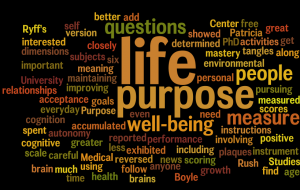 Purpose in life is determined by the meaning you get from everyday activities and how much of your time is spent pursuing goals that are important to you. It can be measured using Ryff’s well-being scale . The instrument measures well-being along six dimensions including autonomy, environmental mastery, personal growth, self acceptance, positive relationships with others and purpose in life. The questions that measure purpose in life are: 5,11,17,23,29,35 and 41. Be careful to follow the scoring instructions closely as the scores for some of the questions need to be reversed before you add them up.
Purpose in life is determined by the meaning you get from everyday activities and how much of your time is spent pursuing goals that are important to you. It can be measured using Ryff’s well-being scale . The instrument measures well-being along six dimensions including autonomy, environmental mastery, personal growth, self acceptance, positive relationships with others and purpose in life. The questions that measure purpose in life are: 5,11,17,23,29,35 and 41. Be careful to follow the scoring instructions closely as the scores for some of the questions need to be reversed before you add them up.
Categories: Cognitive Decline, Memory and Learning, Older Adult, Other, Problem Solving Tags:
Instant Memory Boost With 6 Minutes of Exercise
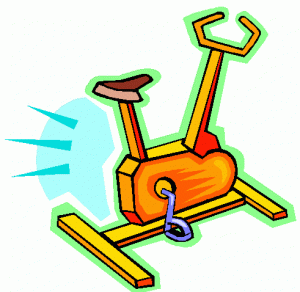 Researchers at the University of California at Irvine have discovered a new brain boosting effect. Healthy and cognitively impaired subjects 50-85 years old were shown a series of positive images. Some of them rested while others exercised on a stationary bike at 70% capacity for six minutes. Then:
Researchers at the University of California at Irvine have discovered a new brain boosting effect. Healthy and cognitively impaired subjects 50-85 years old were shown a series of positive images. Some of them rested while others exercised on a stationary bike at 70% capacity for six minutes. Then:
“One hour later, the participants were given a surprise recall test on the previously viewed images. Results showed a striking enhancement of memory by exercise in both the healthy and cognitively impaired adults, compared with subjects who did not ride the bike.”
While the mechanism at work is not understood, the technique can easily be adapted by anyone looking to enhance memory performance: Intersperse your learning efforts with short bursts of moderately intense physical activity.
I am interested to hear from readers that use physical activity to get immediate improvements in cognitive performance.
Image Source: Stationary Bike
Categories: Cognitive Decline, Memory and Learning, Older Adult Tags:
Exercise Boosts Brain In Proportion to Effort Made
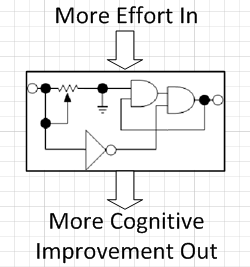 We have reported many times in the Next Brain Blog on scientific studies that suggest exercise improves brain function and cognitive performance. Now a new study led by the director of the Montreal Heart Institute suggests that the more exercise you do the more cognitive improvement you see. The study focused on overweight and inactive adults that were 49 years old on average. A summary of the results:
We have reported many times in the Next Brain Blog on scientific studies that suggest exercise improves brain function and cognitive performance. Now a new study led by the director of the Montreal Heart Institute suggests that the more exercise you do the more cognitive improvement you see. The study focused on overweight and inactive adults that were 49 years old on average. A summary of the results:
“After four months of high-intensity interval training, heart patients in Juneau’s study had markedly improved cognitive functions: the ability to think, recall, and make quick decisions. Even more exciting is that the study demonstrated that the more exercise patients could tolerate, the better their results—their minds became “sharper.”
While there is surely some limit to this effect, it does suggest that increasing the duration/intensity of your workout could lead to an increased brain boost.
Categories: Memory and Learning, Older Adult, Problem Solving, Training Tags:
Does Dental Hygiene Impact Brain Health?
 Can brushing your teeth, wearing dentures or otherwise taking care of your teeth and gums protect memory and brain health? One recent study suggests the answer is yes, and the impact can be significant:
Can brushing your teeth, wearing dentures or otherwise taking care of your teeth and gums protect memory and brain health? One recent study suggests the answer is yes, and the impact can be significant:
“It was found that men with inadequate oral hygiene habits who did not wear dentures had a 91% greater risk of dementia than those with adequate oral hygiene habits.”
The key health behaviors are regular brushing and visits to the dentist.
While more research in needed, this is the first study that I have seen that suggests dental health behaviors could be important to building or maintaining or your next brain.
I am interested to hear from readers about other studies. Are there other oral hygiene techniques we should consider as tools for improving brain function or cognitive performance?
Categories: Cognitive Decline, Lifestyle, Memory and Learning, Older Adult Tags:
Multivitamin Improves Memory in Older Men
 That is the conclusion of one study carried out on 51 men ages 50-74.
That is the conclusion of one study carried out on 51 men ages 50-74.
“The results showed multivitamin supplementation, compared to placebo, significantly improved recognition memory performance, although other cognitive function parameters did not differ between the treatment groups.”
The study goes on to suggest it might also help avoid age-related cognitive decline.
I am interest to hear from readers that use multivitamins to improve brain function or cognitive performance.
Categories: Cognitive Decline, Diet, Memory and Learning, Older Adult Tags: vitamins
Using Technology to Supercharge Kid’s Creativity
 Children are naturally creative. Very creative. As parents we want to enhance our kid’s creativity and make sure that it gets carried forward into adulthood. One tool that aspires to do that is the iPad App Toontastic from Launchpad Toys. Kids draw free style and move around a number of characters (e.g. pirates, queens, monkeys) and narrate a story as they play. All the while the App records what they do and compiles it into a cartoon that can be shared online with friends. So far they have 600,000 story tellers from 150 countries that have made more than 2 million cartoons.
Children are naturally creative. Very creative. As parents we want to enhance our kid’s creativity and make sure that it gets carried forward into adulthood. One tool that aspires to do that is the iPad App Toontastic from Launchpad Toys. Kids draw free style and move around a number of characters (e.g. pirates, queens, monkeys) and narrate a story as they play. All the while the App records what they do and compiles it into a cartoon that can be shared online with friends. So far they have 600,000 story tellers from 150 countries that have made more than 2 million cartoons.
While Launchpad Toys does not claim that the App will improve creativity they designed it to do just that. The company argues we are in a creativity crisis by pointing out that creativity scores have been dropping since 1990 (especially in kids 5-12 years old) just when society and the workplace needs innovation the most.
I am interested to hear from readers that are using Apps to improve cognitive performance in kids.
Categories: Child, Problem Solving Tags: creativity
Using Neuroscience to Optimize the Mature Mind
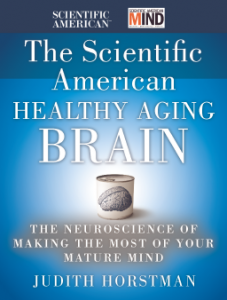 Just finished a good book by Judith Horstman where she explains the neuroscience of making the most of the mature mind. Her findings echo the discussions we have had on the Next Brain Blog. For example, Part three of the book explains in detail how exercise, nutrition, mental stimulation, being social and attitude play a central role in improving cognitive performance as we age.
Just finished a good book by Judith Horstman where she explains the neuroscience of making the most of the mature mind. Her findings echo the discussions we have had on the Next Brain Blog. For example, Part three of the book explains in detail how exercise, nutrition, mental stimulation, being social and attitude play a central role in improving cognitive performance as we age.
She pegs 20-60 years old as the zone of maximum performance for the brain but quickly points out some people peak later in their 70s, 80s and even 90s! She put the central idea of this blog, namely we are responsible for building our next brain, in plain language:
“You built the brain you have today and will continue to refine and remodel it with every action, thought, and feeling and every interaction with people, the experiences, and the environment around you.”
Have you read the book? If so what techniques or insights do think are the most important for building Your Next Brain?
Categories: Books, Cognitive Development, Older Adult Tags:
Good Grades are Mostly Determined by Self-Control
 I am often asked by parents what type of skills are critical for success in school. They hear about special programs or techniques for reading, note taking or math skills and want to know if they work. That is why I am always on the lookout for scientific research that probes how the mind’s of high-performing students work.
I am often asked by parents what type of skills are critical for success in school. They hear about special programs or techniques for reading, note taking or math skills and want to know if they work. That is why I am always on the lookout for scientific research that probes how the mind’s of high-performing students work.
For example, recent research on nearly 700 German eighth graders suggests that a student’s level of self-control is the number one factor that determines success. It is more important than memory, general intelligence, verbal ability, mental speed, numerical ability and even creativity. The researchers claim:
“The data show that the most important factor in getting good school grades was the student’s score on psychological tests of self-control. Cognitive ability was the next best predictor of grades, but in fact, it was not a very strong one.”
While not a surprise to readers of the Next Brain Blog, this is an important finding. Delaying gratification, managing procrastination and the ability to structure and manage time are the capacities that students need for success.
I am interested to hear from readers with insights into how to be an effective student. What learning and testing taking skills are critical and how can we develop them?
Categories: Child, Cognitive Development, College Student, IQ and EQ, Memory and Learning, Training Tags:
Bilingual Kids Can Have Mental Advantages
 I get emails from parents interested in hearing about evidence-based ways to improve their children’s brain function and cognitive performance. So I am always on the lookout for scientific studies that suggest Next Brain development ideas for kids. That’s why a university study from Scotland caught my eye. Researchers there found that children speaking two languages (bilingual) can have more mental agility than those that don’t. More specifically:
I get emails from parents interested in hearing about evidence-based ways to improve their children’s brain function and cognitive performance. So I am always on the lookout for scientific studies that suggest Next Brain development ideas for kids. That’s why a university study from Scotland caught my eye. Researchers there found that children speaking two languages (bilingual) can have more mental agility than those that don’t. More specifically:
“Our study has found that it can have demonstrable benefits, not only in language but in arithmetic, problem solving and enabling children to think creatively. We also assessed the children’s vocabulary, not so much for their knowledge of words as their understanding of them. Again, there was a marked difference in the level of detail and richness in description from the bilingual pupils.”
The children in the study were around age nine and the bilinguals spoke Italian and English. It is important to note that they do not claim that learning a second language will produce these cognitive improvements. But is is suggestive.
Interested to hear from readers that live in a bilingual household or that have extensive second language experience. How does it enrich your language skills and thinking abilities?
Categories: Child, Cognitive Development, Problem Solving, Training Tags:
10 Years of Music Creates Big Cognitive Reserve
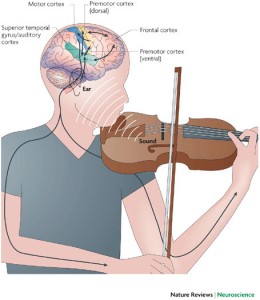 We have covered the importance of music for improving cognitive performance in several posts on the Next Brain Blog. Some researchers argue that learning to play a musical instrument is one of the best ways to improve and maintain brain function.
We have covered the importance of music for improving cognitive performance in several posts on the Next Brain Blog. Some researchers argue that learning to play a musical instrument is one of the best ways to improve and maintain brain function.
A new study, from Emory University supports this idea but provides some specifics:
“… musicians with at least 10 years of instrumental musical training remained cognitively sharp in advanced age.”
Even if subjects stopped playing at some point in life the positive effects linger as long as they played for at least 10 years. Through a decade of musical practice you build up a type of cognitive reserve that can be used later. As the article reports:
“This is an exciting finding in light of recent evidence suggesting that high educational levels are likely to yield cognitive reserve that may potentially delay the onset of Alzheimer’s symptoms or cognitive decline,…”
Ten years may seem like a large investment but developing a strong and resilient brain is a life-long process. Interested to hear from readers that have experience learning and playing a musical instrument. Are you building a cognitive reserve?
Source of Image: When Brain Plays Music
Categories: Music and Audio, Older Adult, Training Tags:
